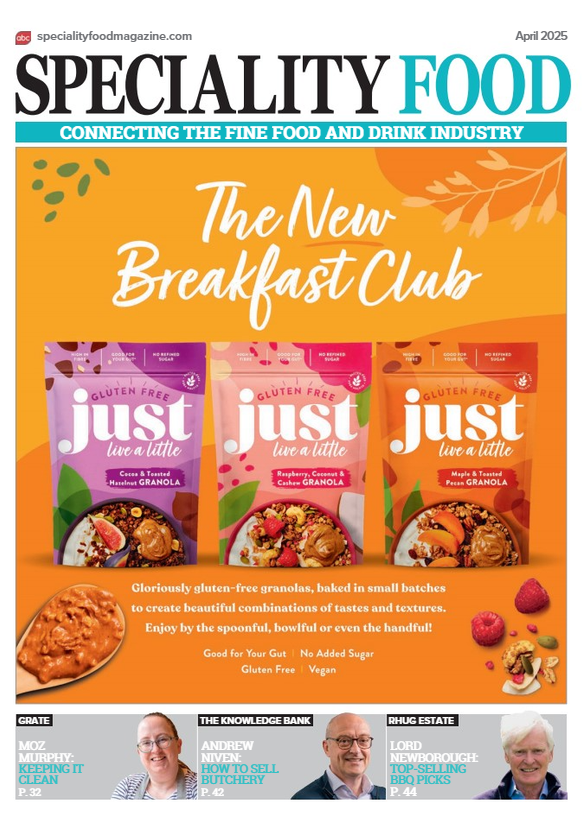The pros and cons of sampling

- “Sticky fingers”
- “Everyone’s a winner”
- “Myths and legends of Turophilia”
- “When ‘cheese’ is not cheese”
- “Don’t disrespect the Cheddar”
"Got any more of that Benly?" she asked, a clutch of small children in tow, all of whom had had a run at my generously-filled sampling dish of Beenleigh Blue – a great ewe's cheese from Ticklemore – and now no more than a few crumbs at the bottom of a shallow porcelain tray remained
“Certainly, madam, how much can I cut for you?”
“Nah, not to buy, more samples - our Stevie really likes that.”
Stevie, presumably named after Gerrard, the Liverpool captain whose replica shirt he sported, looked well enough fed, so I declined to dish out more to save his mother the cost of lunch.
That was the day I decided to stop putting out free samples on our counter. Conventional deli wisdom has it that such sampling is vital to introduce customers to different flavours and encourage trial purchasing. Lifetime value from a conversion should mean that the investment in samples is recouped over time with increased business.
It’s always unwise to blindly accept dogma without thinking through its application to one’s own situation. Our shop is in a tourist town – many of my customers (perhaps 70% – are visitors, whose lifetime value to me is measurable in days or hours, not months or years. Even more importantly, much footfall consists of people killing time in the shops while it’s too hot, wet, blowy or crowded on the beach. These ‘shoppers’ come in with zero intention to purchase and trying to convert them with generous sampling is never going to be cost-efficient – they just want to see everything in the town while they are here, and a visit to the cheesemonger has ended up on their list.
My investment in sampling has to pay back immediately – we leave it to producers to appear at markets and food festivals, dishing out copious samples to all comers. Working with a greater margin and with maximum lifetime value from any converts to their brand, they can afford it. I can’t. However, I do feel sorry for small artisan producers at these events; our trough culture means that expectation of lots of free samples is high, yet with limited or no distribution for their wares, they too are in a position where payback must happen on the day.
So, like us, they have learned to be selective in their offers of samples. We’ll offer a sample of anything in our cheese counter that isn’t sold as a whole item, but only after trying to learn what the customer is looking for. Staff usually taste the cheese at the same time as the customer in order to be able to guide, but also to enter a dialogue in which we can learn what they like and don’t like, and identify what’ll delight them. “Too crumbly? Try this. Too sharp – have you ever tasted this?” Thus we can zero in on a choice that will really suit them, which seems far better than the broadcast approach of leaving a tray of £30 per kilo goodies on the counter for all to devour.
Despite this, we do host occasional free-for-all sampling events, but only when funded and staffed by a producer. Each time I am convinced that had we paid for the sampling activity ourselves, we’d have made little or no money on the day. I trust that the lifetime value of the brand converts gives adequate payback for the producer’s efforts.
Another form of sampling which works for us occurs at events where we can ensure a good concentration of locals with propensity to become loyal customers. Gallery openings, charity events and business parties will all have a budget for food – we can offer discounts, preparation, serving dishes and descriptive materials so that guests learn a bit about what they’re popping into their mouths and most importantly, where it came from.
Cheese wedding cakes work well in taking our cheeses to a wider audience, although I did decline an opportunity presented by one chancer. He e-mailed to say that he and his bride were getting married and that we could have first refusal in providing free cheese. Apparently the discerning profile of his invitees was such that despite the event being over 60 miles away, we’d be raking it in as a result.
Perhaps the best sampling exercises that we do are where punters have bought a ticket for one of our tasting events. We make sure that costs are covered on the night and they have pre-qualified themselves as being serious about cheese by parting with some cash. I make sure that they feel they’ve had good value for money and have earned quite a few long-term customers via such events.
Young Stevie may or may not have grown up to be a discerning cheese aficionado, but we’re still here and profitable after 5 years of trading. Modifying ‘golden rules’ to a unique trading situation has been key to this.
more from Town Crier
-
“Black and White thinking”
08 August 2019 Town CrierLast time around I suggested trumpeting the benefits of the produce we offer, and the importance of conveying its taste and of making each purchase viscerally appealing. -
“We’re a resourceful bunch”
17 May 2019 Town CrierIt’s almost exactly 10 years ago that I sat down to create the first business plan for my cheesemonger. -
“Waxing lyrical”
12 February 2019 Town CrierOn a family holiday to Normandy in 1965, my parents and their adult friends were hugely excited by Livarot and Camembert – seldom seen back home in Hampshire.

